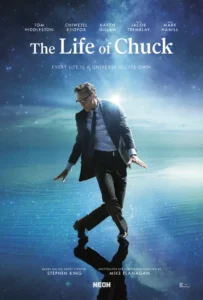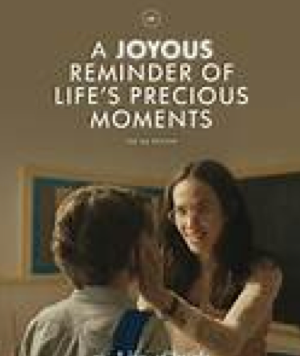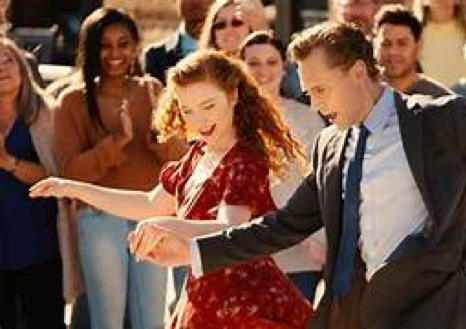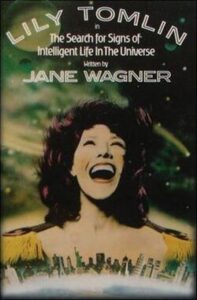 A(nother) Metaphysical Movie Review
A(nother) Metaphysical Movie Review
from Robert Tobin
LIFE OF CHUCK (2025)
DIRECTOR: Michael Flanagan
ACTORS: Tom Hiddleston, Chiwetel Ejiofor, Karen Gillan, Mark Hamill, Mia Sara, Benjamin Pajak
AWARDS: People’s Choice Award at the Toronto International Film Festival (9/6/24)
RUNNING TIME: 111 minutes
Based on short story by Stephen King (2020)
In theaters and online via Prime.
Stephen King has been startling us for a half century through riveting stories widely ranging from Carrie and The Shining to Stand By Me and The Shawshank Redemption. Some observers identify a subtle change in the direction of his work after a 1999 traffic accident, shifting from character to story development and from extremes to the center of possibility.
“The Life of Chuck” presents his latest tale in reverse order, leaving some content completely unexplained or curiously unexamined. This mirrors our own lives, as what seems capricious in Act Three is illuminated by developments in Act Two directly attributable to those in Act One.
“Begin with the end in mind” is among Stephen Covey’s Seven Habits of Highly Effective People. What’s called “working backwards” is actually looking upward rather than downward, and inward as much as outward. Everything we do, however unconsciously or unwittingly, prepares us for a destination we pretend not to know. This pretense masks four apparently ignorable facts: everything is fragile; nothing lasts forever; it’s all fine until it isn’t; and just because it’s fine now does not increase the odds it will remain so, even though we think it does.
The test of faith, hope and love is not found in the last crisis, but the next. The Worst/Last One is underway in Act Three, sadly portraying what it takes to get us to drop our phone and reach out to those closest to us yet so far away. We are introduced to people who are facing disaster the way Rudyard Kipling advised: “keep your heads when others are losing theirs.” They respond “yes” to life’s persistent question – is everything going to be ok? – even when it isn’t.
We depend on probabilities to help us envision the future, but no outcomes are predestined. Rather than trying to avoid such uncertainties and ignore resulting vulnerabilities, Act Two and Act One show these characters embracing Rick Hanson’s advice: “be like Teflon for bad stuff, and Velcro for good stuff.” They ask: what if, instead of becoming lost in the first four stages of grief when facing adversity, we chose to anchor in its fifth and final stage: acceptance? And, they wonder, isn’t this chance to choose why the gods made the world in the first place?
“We contain the universe, and the universe contains us.”
The heart of inquiry, Socrates said, lies in valuing the question as much as the response. The Life of Chuck raises a query neither rhetorical nor academic: “would answers make a good thing better?” Just as we can confuse prosperity with peace, our quest to discover “why?” substitutes satisfaction for fulfillment. We start stumbling over life’s little things when we stop holding on to its biggest, such as composure, coherence, and connectedness.
 Our minds are so easily sidetracked, Miguel Ruiz contends in The Mastery of Knowledge, that our instincts are more closely correlated with reality than our thoughts. When properly attuned, intuition alerts us to what’s coming even, and perhaps especially, when our brains tell us otherwise. The hardest part, says Chuck’s grampa, isn’t that we don’t know what’s going to happen; it’s the waiting until it does. We have trouble giving situations their opportunity to manifest, assuming precious minutes are either not ours to dispense or better spent elsewhere. Meanwhile, our fears will transform secrets into ghosts we try to lock in our attic … unsuccessfully.
Our minds are so easily sidetracked, Miguel Ruiz contends in The Mastery of Knowledge, that our instincts are more closely correlated with reality than our thoughts. When properly attuned, intuition alerts us to what’s coming even, and perhaps especially, when our brains tell us otherwise. The hardest part, says Chuck’s grampa, isn’t that we don’t know what’s going to happen; it’s the waiting until it does. We have trouble giving situations their opportunity to manifest, assuming precious minutes are either not ours to dispense or better spent elsewhere. Meanwhile, our fears will transform secrets into ghosts we try to lock in our attic … unsuccessfully.

Fixated on accomplishments as if they were Babe Ruth’s home runs, we forget he struck out twice as often. This busy-ness is not purposeless, as it quells apprehensions arising as life’s eventualities become inevitabilities. Despite knowing full well what’s going on, we don’t react like dancers who “find the groove, get caught up in the rhythm, and let it fill them;” instead, we entertain ourselves with soap opera dramas real or imagined.
It’s for good reason the maxim “ignorance is bliss” resonates through every society and century. Resistance to such knowing reflects our dread of learning what we wish we didn’t. We tell lies to others because we think they cannot handle truths we ourselves are avoiding; the most debilitating of these: I am insufficient. Chuck’s sixth grade teacher urges him to adopt Whitman’s adage from “Song of Myself”: “I am large … I contain multitudes;” she tells him this will become is true if he thinks it will, resonating Marcus Aurelius’ same prediction two millennia earlier. Now, as then, it is just as simple – and complicated – as that.
The best artwork shows us to ourselves in ways we may not – indeed cannot – see otherwise. Prompting us to reach beyond shallow analogies and self-serving explanations, creativity fosters healing as much through alleviation of anxiety as elimination of pain. Our experience of living is revealed as ongoing experiments not only monochromatic but also idiosyncratic; assembled from inside out and front to back, they are founded upon what we expect as much as anything else. Seeing this process unspool in reverse helps us do what we can to keep it moving forward.
This movie is worth watching if only to receive a message we cannot hear often enough:
“You’re gonna be fine. I don’t know much, but I do know that much. You’ve got a bright sunbeam in front of you, and you’re gonna step right into it.”
 Our cultural domestication is so thorough, we respond to queries about who we are with descriptions of what we do – plumber, nurse, teacher, etc. – and present ourselves accordingly. This movie says we all dress as accountants: grey suit, white shirt, blue tie, and sensible shoes hiding renegade red socks. It proclaims we are wonderful, and duty-bound to remain so. We are shown as refugees of an ongoing cataclysm whose reach exceeds our grasp. We are reminded that being here now is not as easy as it looks and, as a Lily Tomlin character said about the search for intelligent life in the stage show, “The Search for Signs of Intelligent Life in the Universe” (1985), it’s “a lot harder than it sounds.”
Our cultural domestication is so thorough, we respond to queries about who we are with descriptions of what we do – plumber, nurse, teacher, etc. – and present ourselves accordingly. This movie says we all dress as accountants: grey suit, white shirt, blue tie, and sensible shoes hiding renegade red socks. It proclaims we are wonderful, and duty-bound to remain so. We are shown as refugees of an ongoing cataclysm whose reach exceeds our grasp. We are reminded that being here now is not as easy as it looks and, as a Lily Tomlin character said about the search for intelligent life in the stage show, “The Search for Signs of Intelligent Life in the Universe” (1985), it’s “a lot harder than it sounds.”
A meme running throughout this movie – “Thanks for 39 great years!” – underscores how appreciative we’d be to have even one year … or just one day … so great. The ultimate question – what am I doing with my life? – is answered by Chuck with poignance, sensitivity and grace. This movie about his life, told from its end to its beginning, encourages us to do the same.
END
See more of Robert’s Metaphysical Movie Reviews here.
Reviewer Robert Tobin is the father of four, stepfather of four, and grandfather of eleven great people brightening prospects for a world founded upon trust, optimism and compassion.
DONATIONS, SUBSCRIPTIONS
Join our LITERARY LATTÉ. GET LIT! SUBSCRIBE by DONATING. Why? Support a platform for new and emerging writers. Members at higher levels may receive invites to readings and bonus content. Use Perry’s Venmo or PayPal links below.
 or
or
Payable at Venmo perry-king-5 or PayPal link PayPal.Me/yeslpk. For questions, please email us millvalleylit at gmail dot com or info at millvalleylit dot com.
Suggested Donation Levels
$50- Ambrose Bierce
$100- Robert Frost
$200- Jack Kerouac
$500- John Steinbeck
$1000- Ernest Hemingway
